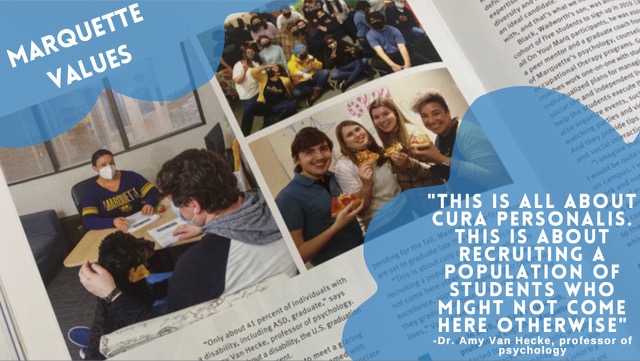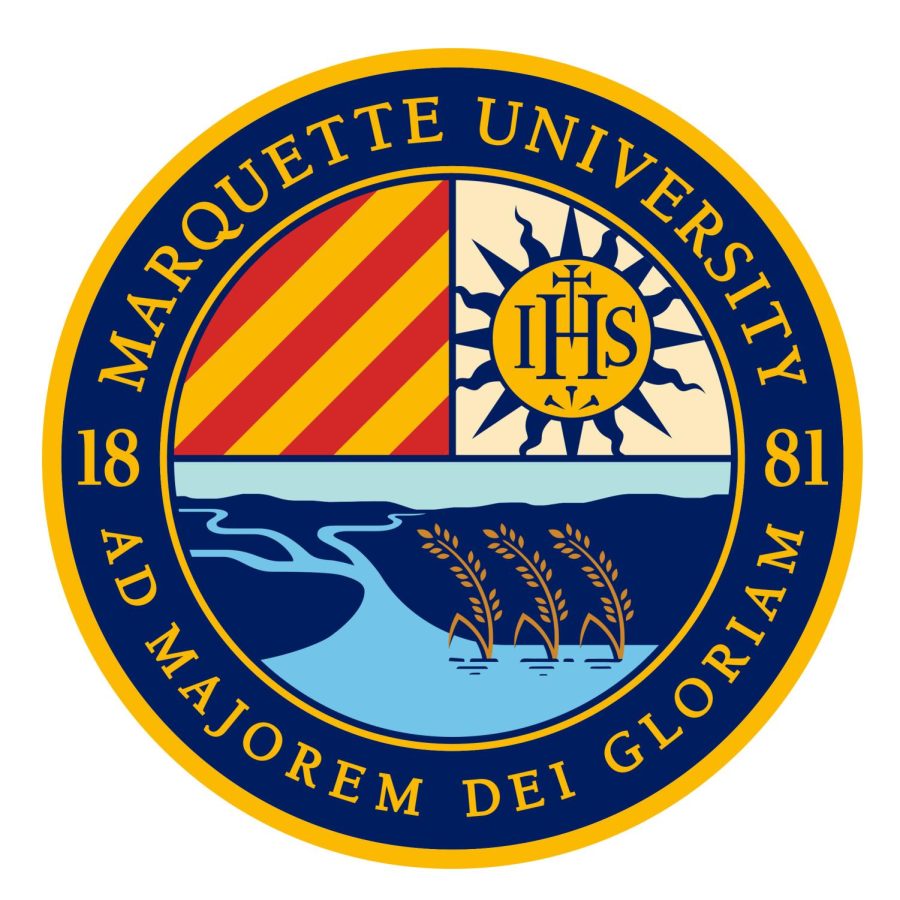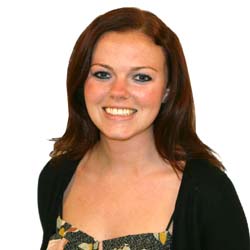For some Marquette students, going away to college their first year is the start of a new chapter of life. New students can face navigating newfound independence and living alone in a heightened academic and social setting. For a student who is neurodivergent, this adjustment can prove itself taxing.
On Your Marq is a program aimed to provide wraparound support to incoming neurodivergent students at Marquette, from their first year to last.
Emily Raclaw, founding director of On Your Marq, started her first day of work the same day as her students in the fall of 2019. Raclaw believes On Your Marq has taught her so much about herself.
“I have to analyze my own success strategies and share them with my students. I get to build relationships and see these students become amazing human beings over a period of time. I have known most of them since they were 18, and now our first class is graduating,” Raclaw said.
On Your Marq provides peer mentoring, independent living support as well as academic and mental health support to neurodivergent students who can register for the program before they step foot on campus.
Raclaw, who herself identifies as a neurodivergent person, finds most people do not understand how much the term neurodivergent itself encompasses.
“Neurodivergent is not a synonym for autism. It encompasses all neurodivergent groupings such as humans with ADHD, dyslexia, dyspraxia and more. When we started On Your Marq, all our students were autistic. That is no longer the case, as with changes to diagnostic criteria, and access to diagnosis, we wanted to be sure we were equitable in our program acceptance criteria,” Raclaw said.
Raclaw wants her students to have a memorable time at Marquette.
“I want Marquette students who struggle with social interactions or adapting to new environments to feel welcomed, accepted and included on campus and be able to share their joy,” Raclaw said.
Raclaw said there is still a strong stigma regarding students who are neurodivergent in an academic setting but encourages all students to make a positive change in their viewpoint. With one in every 68 children being neurodivergent, it is not uncommon to find. However, only 41% of these neurodivergent children will later graduate college, as opposed to about there national 60% graduation expectancy of a non-neurodivergent student.
“I like to describe it as our social skills are written differently. Our instruction manual for seeing the world is completely different than someone else. Being in a new place and not having the same instruction manual as many other people and not having anyone to go to or anyone to understand your own manual is why so many neurodivergent students struggle in the college setting,” Raclaw said.
On Your Marq offers a peer mentoring opportunity. Each incoming first-year student is paired with an upper-level to assist them with any questions they may have about campus, meeting regularly outside of class, and forming a relationship together for two years.
“I enjoy seeing the stigma broken down through our peer mentoring,” Raclaw said.
Raclaw notes any relationship goes two ways. Both the mentor and the mentee in the program, both Marquette students, are gaining valuable skills and lessons from their friendship together.
“When you look at it from a mentor’s point of view, they are going to be comfortable working with and interacting with neurodivergent people in whatever career path they choose. Both sides benefit and form a genuine relationship,” Raclaw said.
Emily Anderson, On Your Marq mentor and senior in the College of Business Administration, recognizes the importance of mentors in her own life. Anderson is grateful for those in her family who have guided her as she grows closer to graduation.
“My grandparents have affected my outlook on life. They taught me how to work hard, overcome adversity and have fun along the way – all great values I cherish and hold with me everyday and pass on to others,” Anderson said.
Relationships like these, Anderson said, inspired her to begin peer mentoring. Anderson facilitates weekly mentor meetings, coaches, recruits and assists with the implementation of On Your Marq social events.
Anderson said she has learned the importance of transparency in her mentor relationship and believes transparency is being as honest, open and accepting as possible to all people. Anderson said she strives to generate an open dialogue about things in a relationship that might need to be evaluated and treated different at all times.
“My mentees teach me that everyone perceives messages differently. Being transparent about our differences allows me to build trust and authentic friendships with those I mentor, as well as making sure I am inclusive as possible in all social and academic situations,” Anderson said.
Anderson said she thinks Marquette’s values foster a community of acceptance, but it is up to students to put in the work.
“We have to continue to be sensitive to the needs of others. This can be done by treating all students as individuals, which creates a more welcoming atmosphere to neurodivergent students,” Anderson said.
Benjamin Jennings, a junior in the College of Education, first heard about the program from his parents, who were scared about their son living away from home for the first time in his life.
“With me going away to college, my parents were a little concerned about me having autism and how that would affect my college life, social life and mental well-being,” Jennings said.
When Jennings was first introduced to the program, he said was rather apprehensive of the support he would later learn to receive.
“I was reluctant to join. I was scared the program would remind me of a special education class, which I didn’t really like. As I got more involved, I found it’s a wonderful community that I have grown to greatly respect,” Jennings said.
Jennings believes the biggest lesson he has learned from On Your Marq is the important value of being punctual in classes.
“My mentor helped me respond on time to emails from my professors. That used to be a big issue for me. I can take a while to respond. Now I feel like I am doing a better job of staying on track with all my academics,” Jennings said.
Jennings himself is currently trying to listen to others more and accept the advice they have to offer, as he said he feels in the past he was very stubborn when it came to allowing others to help him grow.
“At times, I used to think I didn’t need anyone there to guide me, but I have learned to listen and accept help. The advice I have received from On Your Marq will not only help me as a student on the autism spectrum, but help any first-year college student. The lessons I have learned are ones that I try to pass on to others,” Jennings said.
This story was written by Angelina Galullo. She can be reached at angelina.galullo@marquette.edu.







